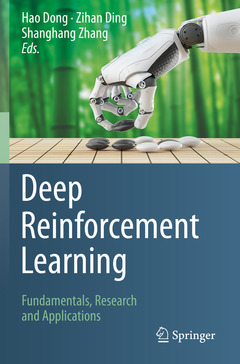Deep Reinforcement Learning, 1st ed. 2020 Fundamentals, Research and Applications

Divided into three main parts, this book provides a comprehensive and self-contained introduction to DRL. The first part introduces the foundations of deep learning, reinforcement learning (RL) and widely used deep RL methods and discusses their implementation. The second part covers selected DRL research topics, which are useful for those wanting to specialize in DRL research. To help readers gain a deep understanding of DRL and quickly apply the techniques in practice, the third part presents mass applications, such as the intelligent transportation system and learning to run, with detailedexplanations.
The book is intended for computer science students, both undergraduate and postgraduate, who would like to learn DRL from scratch, practice its implementation, and explore the research topics. It also appeals to engineers and practitioners who do not have strong machine learning background, but want to quickly understand how DRL works and use the techniques in their applications.
Date de parution : 06-2021
Ouvrage de 514 p.
15.5x23.5 cm
Date de parution : 06-2020
Ouvrage de 514 p.
15.5x23.5 cm



